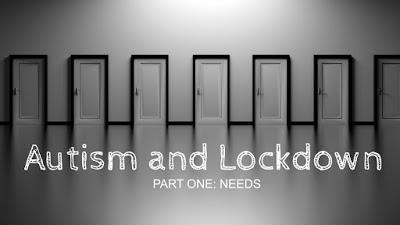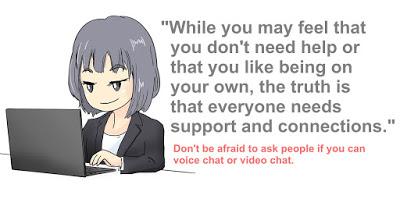
These last few weeks have been unprecedented. Who would have thought that we'd reach a point where a pandemic caused a lockdown in most countries, where economies were are being beaten down and life as we know it is different, at least for the immediate future.
For autistic adults and children, these sweeping changes are their worst nightmare. People with autism work best with routine and don't handle change well at the best of times. The changes that are happening everywhere right now are creating a lot of stress. I want to use this post to talk about how we can reduce that stress and make the lockdown period easier.
Keep the Conversation Going
One of the best ways to lower the stress in people with autism is to keep conversations going. Don't avoid the topic but instead discuss it openly, honestly and positively. If you're a parent, guardian or teacher, talking to children or people with lower abilities to understand, you'll need to adjust your language accordingly but don't sugarcoat things, don't lie and don't "dumb things down" unless you're sure that your audience needs it. Many young adults with autism can interpret details like science and statistics better than you'd expect.If you're the person with autism, make sure that you reach out to others - and often. This is especially important if you live alone. While you may feel that you don't need help or that you like being on your own, the truth is that everyone needs support and connections. You will need this support to get through the difficult times ahead.
If you don't have any local friends, try email and Facebook. Don't be afraid to ask people if you can voice chat or video chat. Voice is cheap and you can usually do it over the phone unless there are high charges. If charges are high, switch to voice-only mode on one of the videoconferencing apps. If you need face-to-face, there are video facilities like Skype, Zoom, WebEx, Hangouts and Teams. The lowest tiers of these are often free with the only costs being your internet connection.

Connecting Kids
Parents especially, listen to your children. If they seem to be missing particular friends, try to contact their parents and organize some "face to face time". Set sensible limits so that the kids don't get bored and be prepared in advance.Don't promise anything to your children until you've been able to successfully connect face-to-face with the other parent. There's a lot of technology involved in these video-conferences and sometimes it just doesn't work. It's better not to build up hope and then fail to deliver.
Before your young children connect, make sure that you have relevant props available, so they don't dash off into other rooms or start moving phones, tablets, laptops and cameras about. You don't want anything dropped and you want to control the environment. Having props handy will also give your kids things to talk about.
If possible, agree to a time limit with your child. For the very young and easily distracted, 5-10 minutes is plenty. Make sure that you give plenty of warning if the time is running out (though you can extend it if things are going well). You don't want the kids getting bored with each other on camera and you certainly don't want a meltdown when it's time to end it.
With older kids, you don't have to be anywhere near as controlling but you'll still want to monitor things a little especially if there's a group. Sometimes groups can turn into mocking or bullying sessions. You can reduce this issue by having the video conferences in an open area rather than in their bedrooms.
Avoid Fatalism
Think about how you're talking about the pandemic at home and who is listening to you. Consider how it's being reported on news channels. We're being told about the high infection rates, high death toll and the curve. What nobody seems to be talking about is recovery. Good news generally doesn't make the mass media. Nothing sells airtime quite like panic and crisis.In your household however, you need to balance out the bad news with good because often autistic people can become trapped in their own feelings of impending doom.

If you're a parent, this means that you need to make sure that your conversations include discussions of what we're going to do after the lockdown. Keep positive - the lockdown will end and things will go back to normal.
Reassure your kids that life will return to normal by saying things like "I'm looking forward to having a holiday at Disneyland once this is all over" or simply "won't it be good to see all of your friends again when school gets back to normal". It doesn't have to be big things, just little reminders that this isn't a change that will last forever.
With much older kids and adults, you can talk about the curve and statistics but be sure to include the positives. It's a curve but ultimately it's bell shaped. Sure, we're trying to create a flatter bell but overall, the infections are expected to drop off eventually, not flatline.
Watch out for OCD
COVID-19 brings with it a lot of rules. Often, people with autism can really get into rules. They will take things literally, for example hand-washing for 30 seconds. This can turn into hand-washing for EXACTLY 30 seconds - with counting. It's quite common in children, even when they're not on the spectrum.The problem is that sometimes these rules expand and begin to take control. The "remain indoors" rule can become literally, remain in the house and essential visits, such as visits to the doctor, can turn into major meltdowns.
Of course, the OCD effect extends well and truly past the realms of hand-washing. It's not such a big stretch from a general fear of germs to a total fear of everything. Animals, dirty dishes, cookware, surfaces of all kinds, toothbrushes, hair brushes and even bedding and clothes can become objects of fascination. In older adults, OCD issues can lead to overuse of chemicals that are not good for the skin or for health in general.
It's very important that while you enforce the good conduct of lock down, you remain on the look out for rules that might need a little flexibility.

